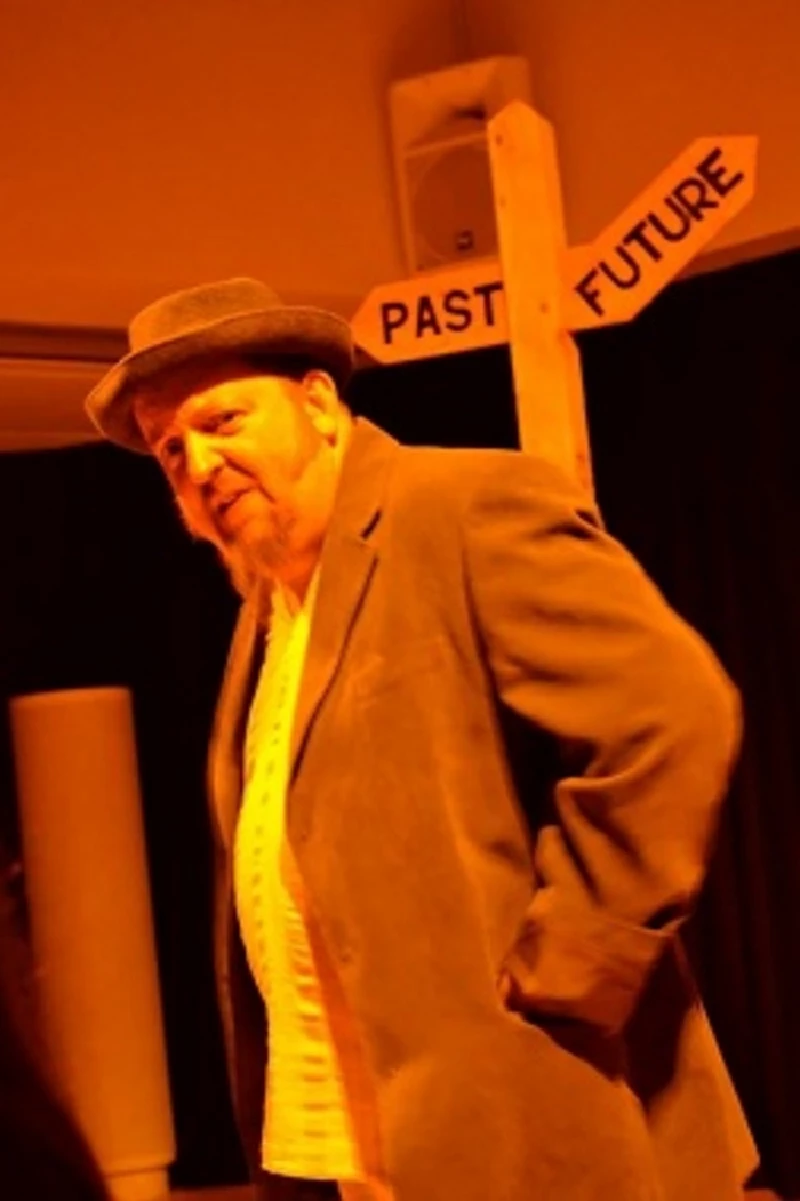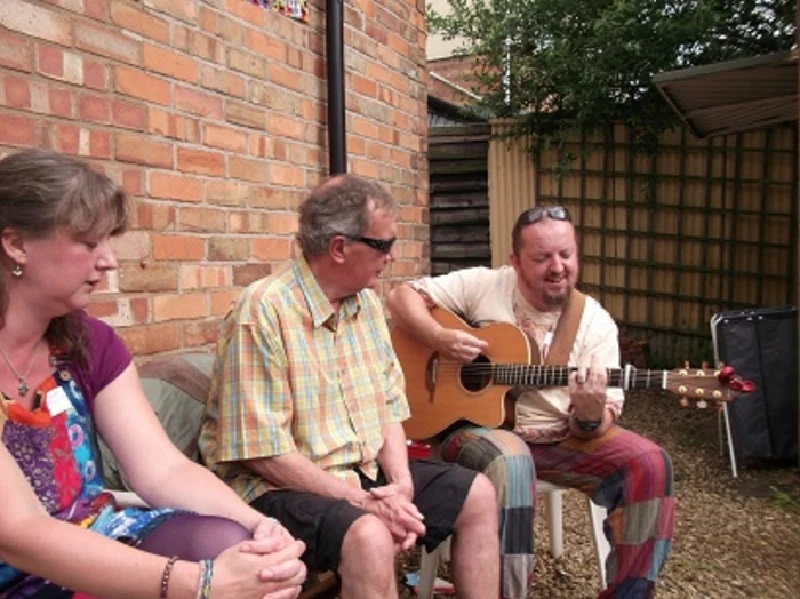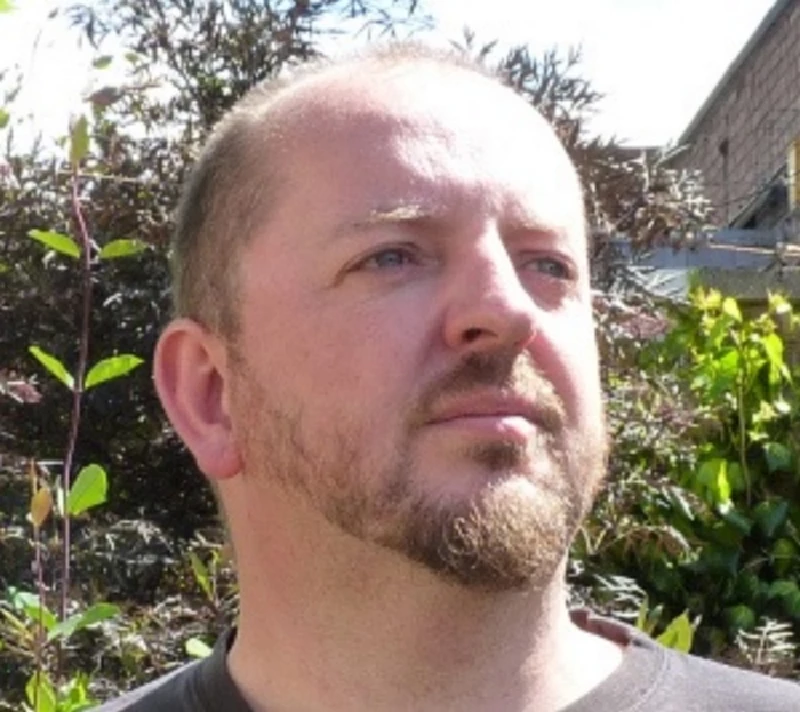Skatz - Interview
by Anthony Strutt
published: 31 / 7 / 2013

intro
Leicester-based folk singer-songwriter and musician Andrew 'Skatz' Scattergood chats to Anthony Strutt about his one-man show 'Father Used to Say' and its accompanying album
Andrew 'Skatz' Scattergood, is someone I originally met six years ago, We bonded instantly over a love of all things, Nick Drake. Skatz is a local folk hero, whom is soon to leave Leicester for Kerry in Ireland and his new life there. Skatz is a solo performer, a teacher of music, a comedian and a very funny one, and also an actor. His recent play and album 'Father Used to Say' mixes together local people's stories, and, both a sad but funny look to the past and also looking forward, it is Skatz's way of saying goodbye to Leicester. Skatz is also a member of the bands Woodstock whom relive that festival through song, and a guitarist for the Drake-influenced band, Bryter Layter. Pennyblackmusic spoke to him about the different segments of his career. PB: How did the name ‘Skatz’ come about? AS: It comes from my surname, Scattergood. I’ve not always been Skatz though. It’s changed depending on where I was living. In the north east of England, everyone’s nickname ends in ‘a’(think Gazza, Bazza, Shazza etc) so I was Scatta. In Cheshire I was Scatty, as everyone’s a bit posher there. Then of course everyone in Leicester is Gaz, Baz, Shaz or Daz so I was given Skatz. Or Skaz. Or worse. More recently I’ve been using Andrew ‘Skatz’ Scattergood on albums and in shows because in schools when I’m running workshops or in more formal work I use my real name, and I want everyone to recognise me. I used to think Scattergood was a ridiculous name but it’s grown on me. It’s unusual. I like unusual. PB: You were Leicester born. Was music a big influence in your early life. You did you do office work for a while. Have you always wanted to be a musician? AS: Actually, I wasn’t born in Leicester. I came here to be a student and never left, but I’ve spent thirty years here, more than half my life, and certainly all of my working life. I did do some warehouse and office work when I left university, all the time writing music and rehearsing and gigging. After a few years I brought out a gig guide magazine and ran that full time for three years so I could immerse myself in the music scene, but I got ripped off by advertising sales staff and it folded. Then I worked in a nightclub for a while, then in a call centre because I wanted a day job to get a mortgage. Then finally I found a company who could employ me as a musician in 2003, and since then I’ve been freelancing full time. In all of that time I was busy being creative, always gigging solo or in bands and developing different ideas. That’s the Leicester music scene for you, tons of talent, lots going on, everybody working with everybody else, very vibrant and not many of us famous. I don’t think most of the musicians I know want fame. Respect, yes. Acceptance, yes. To be groovy and rock yer socks off, yes. But not Robbie Williams famous. PB: Whom were your early influences and when did you get your first guitar? AS: Oh, I have a mammoth set of influences. I absorbed everything I listened to when I was young, and still do. I guess Elvis, Johnny Cash and Jerry Lee Lewis were some of the most influential when I was very young. Such energy. Glam rock was in the charts and I loved that. Then I had Bob Dylan and Neil Young itching away at me while my older brother played prog rock. Genesis, Rush, Yes, all of that lot, and some AC/DC & Deep Purple too. There was a lot of country and folk music around me in the north east where I come from originally. We sang that in school. And I was being taught classical piano from the age of 6, and appearing in musicals too. My mum bought me my first guitar when I was about 10. I taught myself to play from ‘A Tune a Day for Guitar, Books 1 & 2’. I remember mastering 'Home On The Range' and singing it incessantly. PB: You’re a freelance musician, music teacher, actor, comedian; any you prefer? AS: As the song says, "music was my first love and it will be my last." Whatever I do, music is at the heart of it. Even as a comedian I used songs and played guitar. I would say I prefer writing, recording and performing music the most, although very recently I’ve realised I’m really enjoying using music as a therapy after working with some children with profound and multiple learning difficulties. Music has the ability to relax and heal in a very real way, and I’m discovering that in cultures all around the world there are remarkable similarities in the way music is used by healers of all kinds to enrich the spirit and either ‘balance their energy’ or create a meditative state. There seems to be a series of notes and intervals that have appeared in most cultures independently of each other, and these affect different parts of the body. So I’m learning how to use that properly. I feel like an apprentice Shaman, and it feels bizarely right! PB: I would describe your profession is 'an entertainer'. You like to entertain. Would you agree? AS: Absolutely. Anyone who takes the trouble to get up on stage should realise that they must present themselves well and put their all into it. I love expressing the music for myself and for an audience, because if you can do both of these at the same time, you end up with an audience who are totally entranced by what you’re doing and who are carried along by your energy. There’s really nothing like being in the middle of all of that. I implore all musicians to do the same. You don’t have to leap about to do it either. Some do it by projecting an intensity, or just by engaging the audience by catching their gaze. PB: Do you prefer teaching, or playing live? AS: That’s an easy one, playing live every time. I do very little actual instrumental teaching. There are workshops to encourage people to write songs and use music creatively but I don’t really teach much. I might do more of that in the future, who knows. PB: As an artist, how many albums have you done now, and how do you go about writing them? AS: I’ve done two solo albums and more than a dozen albums with bands, plus much music for shows and healing sessions. I write in a few different ways. Sometimes I start with a guitar riff and improvise around it for a while until a melody or some words arrive in my head. Sometimes I write the lyrics first, which can make for a more complex set of chords, especially if I don’t focus too much on rhyme or meter and go for the words that paint the picture best. Other times I work out what mood I want the music to be and move on from there. Sometimes I pick a different instrument to start on like the piano, that makes me write a whole other kind of melody. PB: ‘Father Used To Say’, your latest work, is based on your own experiences and that of local people. How long did it take to write and research? AS: I spent two months interviewing people as research, then about two months writing the play, then there were rehearsals. Some of the songs happened during the research, others during the writing. It was really exciting because I’d already booked the performances without having written the play, so I’d forced myself into a tight deadline. Even during rehearsals, the play changed radically as the director and I played with the character, so I guess altogether you could say the whole thing was about six months in the making. PB: How did your Nick Drake tribute come about? Would you say he was the main guy that changed everything for you? AS: That began about sixteen years ago when I heard a friend playing some of Nick’s songs at an open mic night. We became good friends and he played me a couple of the albums one night, and I was hooked. He showed me how to play some of the songs and introduced me to open tunings. Before that, I had really been a ‘strummer not a picker’. Suddenly there was a whole new world of possibilities ahead of me. I grew my fingernails and started adding acrylic tips so I could strum and pick together. Learning Nick’s songs became a bit of an obsession, and a few of us started doing it. Before we knew it, we had a band. So yes, he did change everything for me. He wasn’t the only one to do that, but he was one of the few who had a massive impact. PB: You have also acted. Is that in local theatre shows? AS: I acted in amateur theatre from an early age, then went on to study Performing Arts at university, specialising in Drama but I must say I spent a lot of time performing music too. Since then I’ve only really acted in one play, which was a folk opera written by a local musician. I played a butcher accused of murder. Quite a dramatic part which earned me some accolade and inspired me to start writing plays myself. I wrote a play about Leicester’s historical characters, the music from which I toured around festivals and venues across the UK with my co-writer. That got really popular. ‘Father Used To Say’ sprang from that, and was the first time I’ve truly felt like an actor. It was a one man show so I was totally exposed on stage for nearly two hours. The part was a joy to play. Full of pathos and humour and had audiences laughing and crying to the end. My proudest working moment I think. PB: You’re soon to leave Leicester for Ireland; are you planning on the same career but in a different land? AS: Well, more or less, yes. As a freelance musician, actor, playwright, entertainer, singer songwriter and now healer I’ve got a very varied career, so it won’t be quite the same; there’s sure to be a different balance and focus. It’s a very different place from Leicester. The nearest city is far away. It’s all very rural. I’m going for the tranquility, the beauty and the community, and I will use my music in whatever way is needed and however it flows from me. There’s a very artistic community in South West Kerry. One idea is to work with local artists there to create combinations of activities which tourists can sign up to, working together with local businesses so that everyone can benefit; and perhaps with an emphasis on helping and healing people, and raising money for those who need it most in the community. I’m fairly sure I will be in a few bands, and be involved in putting on gigs and encouraging local songwriters. Whatever ideas I have now, the most important thing to do is to become a part of the community there and give what talent I have. They’re lovely people, and I can’t wait to get on with my new life. PB: Thank you.
Picture Gallery:-


most viewed articles
current edition
Screamin' Cheetah Wheelies - Sala Apolo, Barcelona, 29/11/2023 and La Paqui, Madrid, 30/11/2023Anthony Phillips - Interview
Difford and Tilbrook - Difford and Tilbrook
Rain Parade - Interview
Oldfield Youth Club - Interview
Autumn 1904 - Interview
Shaw's Trailer Park - Interview
Cafe No. 9, Sheffield and Grass Roots Venues - Comment
Pete Berwick - ‘Too Wild to Tame’: The story of the Boyzz:
Chris Hludzik - Vinyl Stories
previous editions
Microdisney - The Clock Comes Down the StairsHeavenly - P.U.N.K. Girl EP
World Party - Interview
Michael Lindsay Hogg - Interview
Ain't That Always The Way - Alan Horne After The Sound of Young Scotland 2
Joy Division - The Image That Made Me Weep
Dwina Gibb - Interview
Joy Division - The Image That Made Me Weep
World Party - Interview with Karl Wallinger
Barrie Barlow - Interview
most viewed reviews
current edition
Marika Hackman - Big SighSerious Sam Barrett - A Drop of the Morning Dew
Rod Stewart and Jools Holland - Swing Fever
Loves - True Love: The Most of The Loves
Ian M Bailey - We Live in Strange Times
Paul McCartney and Wings - Band on the Run
Autumn 1904 - Tales of Innocence
Banter - Heroes
Roberta Flack - Lost Takes
Posey Hill - No Clear Place to Fall
Pennyblackmusic Regular Contributors
Adrian Janes
Amanda J. Window
Andrew Twambley
Anthony Dhanendran
Benjamin Howarth
Cila Warncke
Daniel Cressey
Darren Aston
Dastardly
Dave Goodwin
Denzil Watson
Dominic B. Simpson
Eoghan Lyng
Fiona Hutchings
Harry Sherriff
Helen Tipping
Jamie Rowland
John Clarkson
Julie Cruickshank
Kimberly Bright
Lisa Torem
Maarten Schiethart